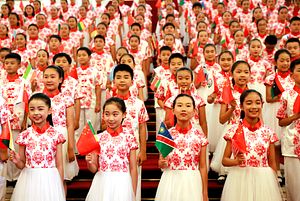This year marks the 20th anniversary of the founding of the Forum on China-Africa Cooperation (FOCAC). It was one of many diplomatic milestones to have gotten less attention than deserved thanks to the intervention of COVID-19. Since 2000, FOCAC, and especially its triennial leaders’ summits, has become one of the bellwethers of the China-Africa relationship, setting goals for the primary areas of cooperation.
The Diplomat speaks to Deborah Brautigam, Bernard L. Schwartz Professor in International Political Economy and director of China-Africa Research Initiative at the Johns Hopkins School of Advanced International Studies in Washington, D.C. about the importance of FOCAC and the changing course of China-Africa relations in the 21st century.
What was the primary motivation for setting up FOCAC back in 2000? How would you evaluate the success of the platform based on its own ambitions?
The FOCAC was patterned on Japan’s earlier establishment of TICAD (Tokyo International Conference on Africa’s Development). Both provided convenient ways for a prominent Asian power to coordinate its development and economic cooperation outreach with Africa’s 54 countries. The Forum provides a way for Chinese and African officials to strategize about continent-wide areas where Chinese engagement can contribute to African development aspirations. It has evolved into a platform for deal-making, as well as a highly anticipated venue for Chinese leaders to announce specific pledges for development assistance and investment.
How has China’s approach to African countries changed over the past 20 years? Have China’s goals for FOCAC evolved or expanded during that time?
FOCAC set up high expectations that Beijing would continually expand its pledges of aid, loans, and other forms of economic engagement. These have been tempered in recent years as pledges plateaued. The rhetoric of FOCAC as a consultative mechanism has to be filtered through changes in China’s own domestic requirements. Fortunately for many African countries, China’s overcapacity in the construction industry, high levels of foreign reserves, the attraction of less demanding markets for growing Chinese capacity in sectors like telecoms, and the need to move low-level manufacturing offshore has coincided with Africa’s infrastructure gap, financing gap, and desire to move up the value chain. China’s relatively new interest in security cooperation is an example of how Africa (and FOCAC) continues to evolve, with military cooperation being added to the other forms of cooperation.
COVID-19 is already being talked about as a paradigm-shifting event for global geopolitics. How has the pandemic impacted China’s image in African countries? Do you see this as a lasting change or a temporary one?
We don’t have post-pandemic public opinion polls to measure China’s image in Africa, although the latest Afrobarometer surveys conducted in 2019/2020 report continued positive impressions of China. Anecdotally, African publics do not seem to be blaming China for the pandemic, and the resurgence of Chinese economic activity will be seen positively as it will contribute to increased demand for African exports.
Where China’s image may fall short is in the lack of transparency about how Chinese banks are managing debt restructuring. While debt restructuring with the China Export Import Bank and China Development Bank is clearly ongoing, as Zambia’s case details, Beijing has released only the vaguest of details on the number of countries that have completed negotiations for debt service suspension.
With its whole-of-continent approach, FOCAC encourages the narrative of “China-Africa” relations (it’s in the name, after all). To what extent is it helpful to talk about “China-Africa” relations, writ large, versus a series of bilateral relationships between China and its diverse partners on the continent?
Because of the continent-wide scope of the FOCAC programs and the joint nature of the negotiations leading up to FOCAC, where the multilateral nature of the institution is clear, and China’s close monitoring of African strategies as spelled out by the African Union, there is a China-Africa relationship. While the continent as a whole has a certain level of strategic importance for China, only a handful of individual country relations have been elevated to comprehensive strategic partnerships: Algeria, Egypt, and South Africa. Thus the bilateral relations are individually important, but it is the aggregate of relationships (diplomatic, commercial, and so on) that contribute to Africa’s continued importance.
It’s still early, but what will you be watching for at the next FOCAC summit in 2021?
Health cooperation will likely continue to be on the agenda. We’re also likely to see continued emphasis on industrial cooperation, given the good fit between Chinese needs and African needs. New commercial loans will be downplayed, and the Chinese will emphasize grants and foreign aid resources. Rather than loans, I anticipate increased emphasis on equity investment, perhaps through public private partnerships in areas like power production and toll roads.

































